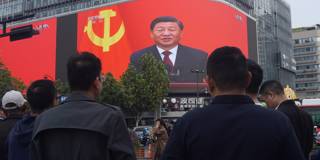OnPoint Subscriber Exclusive
The Big Picture brings together a range of PS commentaries to give readers a comprehensive understanding of topics in the news – and the deeper issues driving the news. The Big Question features concise contributor analysis and predictions on timely topics.

Emperor Xi
Watching President Xi Jinping deliver confident speeches and cement his grip on power at the Communist Party’s 20th National Congress, one might not guess that China is enduring its most challenging year since his ascent to power a decade ago. But, facing a sharp economic slowdown and rising tensions with the West, can China’s most dominant ruler since Mao Zedong realize his ambitions for the country?
As Minxin Pei of Claremont McKenna College reminds us, after Mao “led the Party from one disaster to another,” his successor, Deng Xiaoping, introduced term limits on Party leaders. But Deng’s “conviction could not overcome his self-interest,” leaving gaps in “the institutional edifice he built in the 1980s.”
According to Chris Patten, Chancellor of the University of Oxford, self-interest also explains Party leaders’ support for Xi’s consolidation of power. But the Party will pay a heavy price for allowing Xi to acquire “Mao-like powers,” not least because China’s economic boom – a key source of the regime’s legitimacy – seems like “another potential casualty of his unchecked rule.”
Jim O’Neill, former Chair of Goldman Sachs Asset Management, agrees, noting that some of Xi’s policies – from zero-COVID to the Belt and Road Initiative – have caused significant economic damage in recent years. Unless he revises them, China will not reach its goal of doubling its GDP per capita by 2035 from the 2020 level.
Xi seems unlikely to do any such thing. As Yale’s Stephen S. Roach points out, Xi views “foregone economic growth” as a “necessary price to pay for national security.” While the “opaque ideological dogma of the Congress only hinted at what to expect from China,” Xi’s past bellicose rhetoric suggests that he will lead an increasingly “conflict-prone” country.
Against this backdrop, former NATO Secretary-General Javier Solana warns that the United States must not respond to Xi’s recent “foreign-policy assertiveness” – which has stoked fears that China will invade Taiwan – by closing communication channels. “US-China relations will define the twenty-first century, so forging a path to peaceful coexistence is crucial.”